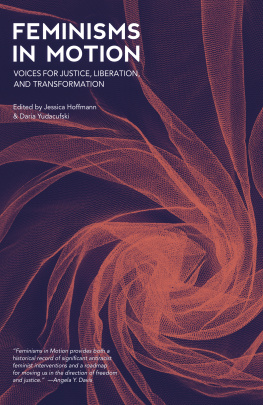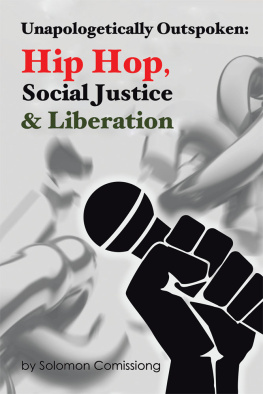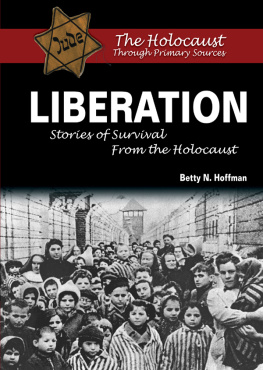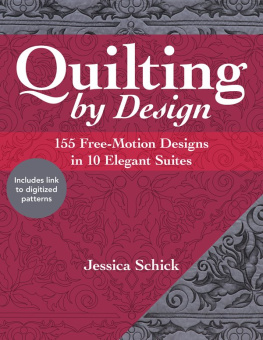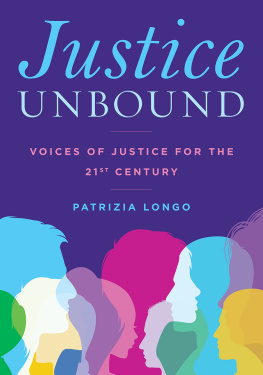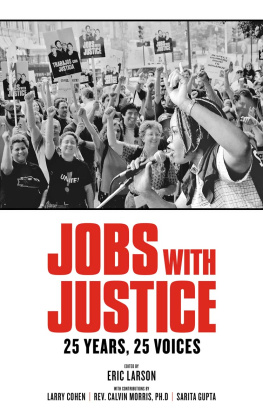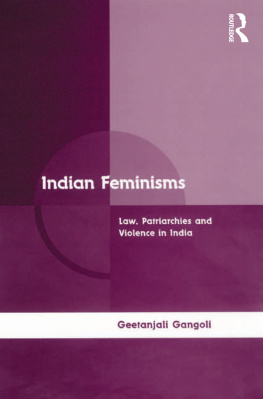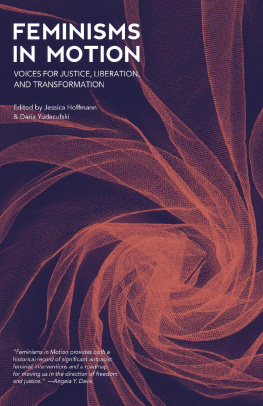Hoffman Jessica - Feminisms in motion: voices for justice, liberation, andtransformation
Here you can read online Hoffman Jessica - Feminisms in motion: voices for justice, liberation, andtransformation full text of the book (entire story) in english for free. Download pdf and epub, get meaning, cover and reviews about this ebook. City: Chico;California, year: 2018, publisher: Perseus Books, LLC;AK Press, genre: Home and family. Description of the work, (preface) as well as reviews are available. Best literature library LitArk.com created for fans of good reading and offers a wide selection of genres:
Romance novel
Science fiction
Adventure
Detective
Science
History
Home and family
Prose
Art
Politics
Computer
Non-fiction
Religion
Business
Children
Humor
Choose a favorite category and find really read worthwhile books. Enjoy immersion in the world of imagination, feel the emotions of the characters or learn something new for yourself, make an fascinating discovery.
- Book:Feminisms in motion: voices for justice, liberation, andtransformation
- Author:
- Publisher:Perseus Books, LLC;AK Press
- Genre:
- Year:2018
- City:Chico;California
- Rating:3 / 5
- Favourites:Add to favourites
- Your mark:
- 60
- 1
- 2
- 3
- 4
- 5
Feminisms in motion: voices for justice, liberation, andtransformation: summary, description and annotation
We offer to read an annotation, description, summary or preface (depends on what the author of the book "Feminisms in motion: voices for justice, liberation, andtransformation" wrote himself). If you haven't found the necessary information about the book — write in the comments, we will try to find it.
Hoffman Jessica: author's other books
Who wrote Feminisms in motion: voices for justice, liberation, andtransformation? Find out the surname, the name of the author of the book and a list of all author's works by series.
Feminisms in motion: voices for justice, liberation, andtransformation — read online for free the complete book (whole text) full work
Below is the text of the book, divided by pages. System saving the place of the last page read, allows you to conveniently read the book "Feminisms in motion: voices for justice, liberation, andtransformation" online for free, without having to search again every time where you left off. Put a bookmark, and you can go to the page where you finished reading at any time.
Font size:
Interval:
Bookmark:
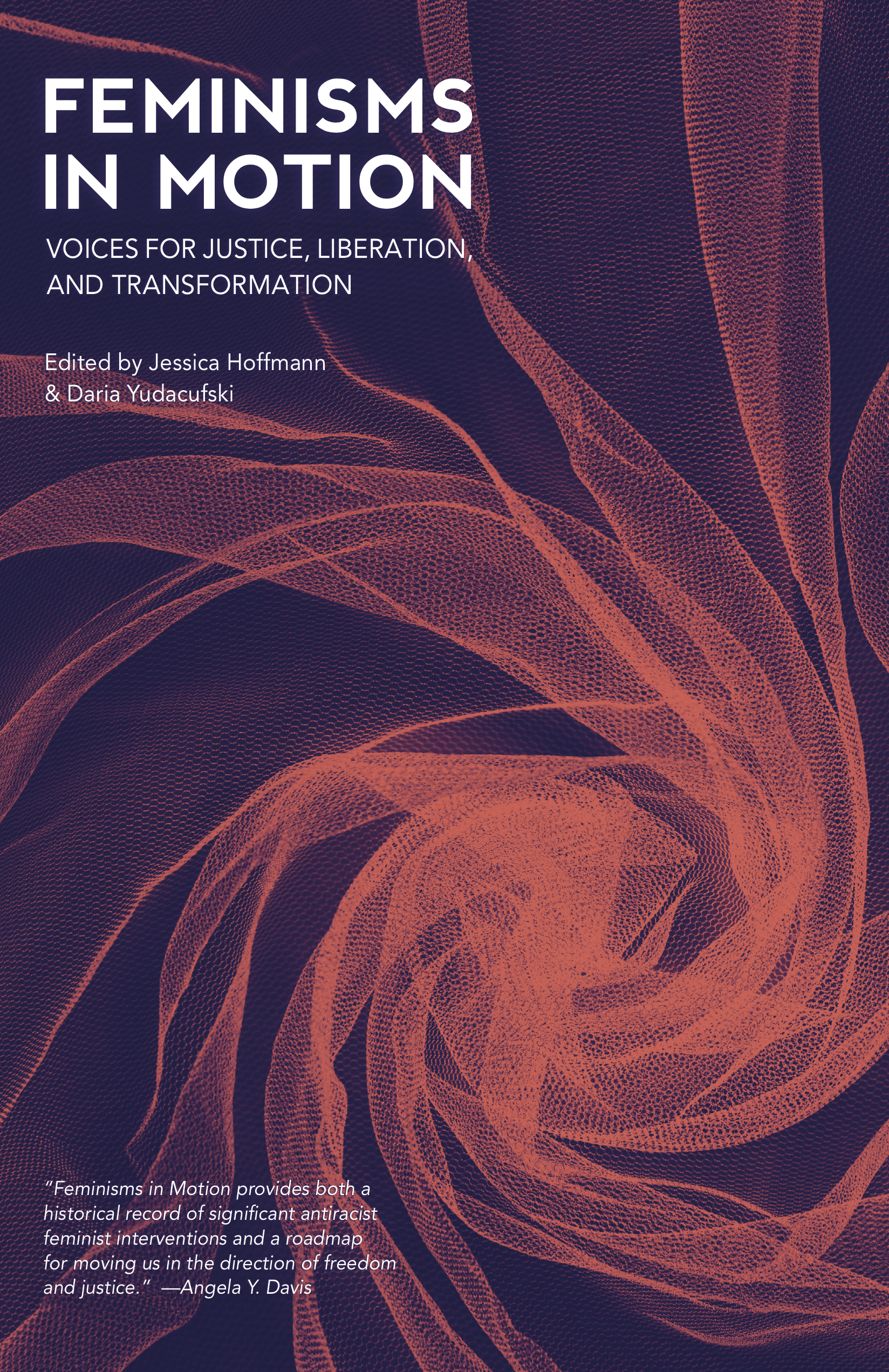
FEMINISMS
IN MOTION
Voices for Justice, Liberation, and Transformation
Edited by Jessica Hoffmann
& Daria Yudacufski
2018 Jessica Hofmann and Daria Yudacufski
All essays to the individual authors, as noted
This edition 2018 AK Press (Chico, Edinburgh)
ISBN-13: 9781849353342
E-ISBN: 9781849353359
Library of Congress Control Number: 2018932237
AK Press
370 Ryan Ave. #100
Chico, CA 95973
United States
www.akpress.org
akpress@akpress.org
AK Press
33 Tower St.
Edinburgh EH6 7BN
Scotland
www.akuk.com
ak@akedin.demon.co.uk
The above addresses would be delighted to provide you with the latest AK Press distribution catalog, which features books, pamphlets, zines, and stylish apparel published and/or distributed by AK Press. Alternatively, visit our websites for the complete catalog, latest news, and secure ordering
Cover and interior design by Morgan Buck
Printed in the USA
Audre Lorde
Contents
Acknowledgments
Thank you to everyone who contributed to, subscribed to, volunteered with, read, or otherwise participated in the conversation of make/shift . Thank you to Zach, Andrew, Jeremy, Morgan, and everyone at AK Press for their work on this book and so many others. And thank you to everyone who has made, is making, and will make movements for justice, liberation, and transformation.
Introduction
By Jessica Hoffmann and Daria Yudacufski
We edited and published make/shift , a biannual independent magazine of community-based, intersectional feminist art and action, from 2007 to 2017. We mailed out the twentieth and final issue in the summer of a year that felt like a watershed moment for feminism in the U.S. mainstream. It was a year that started with enormous Womens Marches and closed with a social-media outpouring of truths about sexual violence that knocked powerful abusers from their pedestals one after another. A sliver of a 1968 poem by Muriel Rukeyser was being quoted all over: What would happen if one woman told the truth about her life? Rukeyser asked. She quickly answered, The world would split open.
In some ways it does feel like the world is splitting open. But it also feels entirely unsurprising. Even if we werent editors of a feminist magazine who have had the repeated experience of finding that the majority of submissions to each issue were about sexual violence, we are women in this world. We know pervasive sexual violence is the truth because it is and because we do not have the privilege of rationalizing or denying it. (In other words, and of course, #ustoo.)
And: that Rukeyser poem is actually about a different kind of war. Its called Kthe Kollwitz, and its about an artist and the world wars she lived through, and economic inequality, and the gendered experience of these, and motherhood, and art, and yes the body (simultaneously individual and social), too.
But what can that mean, one woman? We know #metoo, the social-media hashtag that is threading together stories of sexual violence, is true because we are women in this world, but the second we think that, we hear Sojourner Truth asking Aint I a woman? at a womens rights convention in 1851, insisting on the inextricableness of gender and race in her identityand arguing for the linking of nineteenth-century struggles for womens rights and for the abolition of slavery. We hear the Black feminist group the Combahee River Collective saying, in 1977, We are actively committed to struggling against racial, sexual, heterosexual, and class oppression, and see as our particular task the development of integrated analysis and practice based upon the fact that the major systems of oppression are interlocking. The synthesis of these oppressions creates the conditions of our lives. We hear Kimberl Crenshaw synthesizing these ideasideas born from livesin the term intersectionality in the 1980s. And we hear queer feminism asking what this word woman means while knowing that if violence against women were taken seriously, at large, addressing it would mitigate other violences (as Courtney Desiree Morris argues in her widely shared 2010 essay originally published in make/shift , Why Misogynists Make Great Informants: How Gender Violence on the Left Enables State Violence in Radical Movements). By now weve all read the stories about how many of the men behind recent mass shootings have a history as domestic abusers. We know violences, and the systems of power they enforce, are connected.
It is true, this idea that if one woman told the truth about her life, the world would split open, and it is an idea ripe for questioning, challenging, expanding, refracting. To keep pushing at it: What should we make of a split, or several? Is the world already split open along multiple seams? What do these splits feel like? What do they do? What could they do? What would it take for the world to heal?
The Combahee River Collective, again in their 1977 statement, suggested an answer: If Black women were free, it would mean that everyone else would have to be free since our freedom would necessitate the destruction of all the systems of oppression.
There are multiple feminisms, and we think the most promising of them keep asking questions, keep feeling the truths of interconnectedness, keep pushing to get at the roots, to expand the field of what to care about (everything) and what is possible. In a world structured on hierarchies enforced by violence by way of disconnection, we believe intersectional feminism offers the best viewsand examplesof ways of living based on the reality of interdependence, ways that would allow everyone to thrive.
A decade ago, after a few years of working together on a smaller zine called LOUDmouth , we and our friend Stephanie Abraham founded make/shift magazine to document, critique, and participate in the feminisms of our time, with a specific mission to amplify antiracist, queer, and transnational voicesthat is, voices that challenge and create alternatives to systems of oppression in an interconnected, interdisciplinary, multi-issue way. While other feminist media outlets were offering feminist critiques of dominant culture or looking at the effects of current events on women, we wanted to document feminist culturesthe actions and ideas that were emerging from lives and communities to uproot violences and transform hierarchies, to create something more like freedom and sustenance for everyone.
With backgrounds as organizers, educators, activists, writers, and independent media makers, we started make/shift to cover the movements we were part of, spotlighting community-based art and action, the kind of work that pushes feminisms to grow, usually from the margins. We wanted to publish voices speaking in the tradition of Audre Lorde, Gloria Anzalda, Angela Davis, bell hooks, Trinh T. Minh-ha, Mujeres Creando, and so many other feminists of color who have insisted on complexity, pointed out the connections, and refused to separate the intimate from the public, the cultural from the political, the creative from the critical. That is the tradition we believe is most likely to build a world in which everyone can be whole and free.
Of course, a media outlet that represents these values should be made with a process that reflects these values. That meant, among other things, committing to collaborative editing and to sharing media skills; publishing a majority of women of color in each issue; paying writers at least something for their contributions (even if we never had enough money to pay what they deserved for their work); editing and publishing the magazine in a way that was sustainable for us to do, as volunteers, on top of busy jobs and lives; and valuing critique, accountability, multiplicity, and complexity. Conventional magazine wisdom is that there should be a consistent voice and style from cover to cover; make/shift deliberately flouted that, putting different forms, styles, and voices in conversation (the way they actually are).
Font size:
Interval:
Bookmark:
Similar books «Feminisms in motion: voices for justice, liberation, andtransformation»
Look at similar books to Feminisms in motion: voices for justice, liberation, andtransformation. We have selected literature similar in name and meaning in the hope of providing readers with more options to find new, interesting, not yet read works.
Discussion, reviews of the book Feminisms in motion: voices for justice, liberation, andtransformation and just readers' own opinions. Leave your comments, write what you think about the work, its meaning or the main characters. Specify what exactly you liked and what you didn't like, and why you think so.

